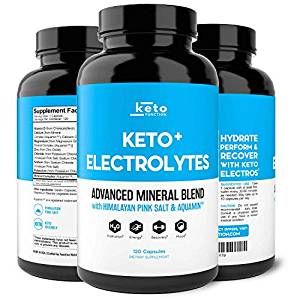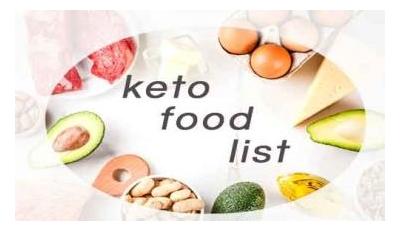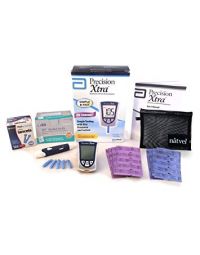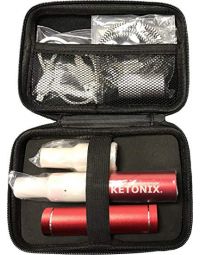The ketogenic diet, defined by low carb, high fat, and moderate protein intake, is a trendy diet for weight loss these days. When switching to such a different diet, many new keto diet practicers experience some side effects for the first week or so, known as “keto flu” or “carb flu.” What exactly is keto flu, and what can you do to alleviate its symptoms?

Though not everyone gets it, keto flu is common for new keto dieters. During the first week that you start practicing, you likely will notice changes in your digestion, mood, and energy levels, along with various other discomforts. These typically peak around days 3-5, then will gradually diminish the longer you stay on the diet.
Common symptoms of keto flu include:1,2
- Fatigue
- Headache
- Irritability
- Poor concentration
- Difficulty focusing (brain fog)
- Low motivation
- Dizziness
- Sugar cravings
- Nausea
- Muscle cramps
- Vomiting
- Constipation
- Diarrhea
- Muscle weakness
- Stomachaches
- Difficulty sleeping


Feeling withdrawal symptoms is normal when you suddenly drop any kind of major calorie/nutritional source from your diet, whether its carbs or fats or something else. In the case of the keto diet, the lack of carbs changes your body’s metabolism dramatically within the first day. You enter a state called ketosis, which causes your body to burn lipids to produce cellular energy rather than relying on glucose and other sugars as a quick energy source.3
Certain organs in your body use energy at higher rates than others. Your brain has an especially high energy demand and can take a few days to become accustomed to the lack of easily-metabolized carbs available. During this time, your insulin levels will drop, and your body will start excreting more sodium and water. Increased frequency of urination is a common side effect during the first week on a keto diet. Carb withdrawal along with loss of electrolytes can cause the symptoms of keto flu.
Feeling withdrawal symptoms is normal when you suddenly drop any kind of major calorie/nutritional source from your diet, whether its carbs or fats or something else. In the case of the keto diet, the lack of carbs changes your body’s metabolism dramatically within the first day. You enter a state called ketosis, which causes your body to burn lipids to produce cellular energy rather than relying on glucose and other sugars as a quick energy source.3
Certain organs in your body use energy at higher rates than others. Your brain has an especially high energy demand and can take a few days to become accustomed to the lack of easily-metabolized carbs available. During this time, your insulin levels will drop, and your body will start excreting more sodium and water. Increased frequency of urination is a common side effect during the first week on a keto diet. Carb withdrawal along with loss of electrolytes can cause the symptoms of keto flu.
Feeling withdrawal symptoms is normal when you suddenly drop any kind of major calorie/nutritional source from your diet, whether its carbs or fats or something else. In the case of the keto diet, the lack of carbs changes your body’s metabolism dramatically within the first day. You enter a state called ketosis, which causes your body to burn lipids to produce cellular energy rather than relying on glucose and other sugars as a quick energy source.3
Certain organs in your body use energy at higher rates than others. Your brain has an especially high energy demand and can take a few days to become accustomed to the lack of easily-metabolized carbs available. During this time, your insulin levels will drop, and your body will start excreting more sodium and water. Increased frequency of urination is a common side effect during the first week on a keto diet. Carb withdrawal along with loss of electrolytes can cause the symptoms of keto flu.

Stay Hydrated and Replenish Electrolytes
Drinking plenty of water is always a good idea and is helpful for virtually any health condition. As you are losing extra water and sodium during your transition into the keto diet, it is important that you keep replenishing these. Dehydration and loss of electrolytes can make you tired and give you headaches and muscle aches. Fortunately, that is easy to remedy by drinking extra fluids. A good rule of thumb is to drink a full glass of water whenever you feel thirsty, and make sure you are drinking at least three liters every day while you are on the keto diet.1,2
To up your electrolyte intake, try mixing half a teaspoon of salt into an 8-ounce glass of water and drinking it. For more flavor, broths and bouillons, such as bone broth or vegetable stock with an optional spoonful of salted butter are good alternatives. After drinking such a water/electrolyte mix, you can start to feel better within 15 to 30 minutes. Also, you may wish to take a multivitamin, or mineral supplements, to replace the calcium, magnesium, and potassium you would otherwise receive from starchy foods.1,2
Drinking plenty of water is always a good idea and is helpful for virtually any health condition. As you are losing extra water and sodium during your transition into the keto diet, it is important that you keep replenishing these. Dehydration and loss of electrolytes can make you tired and give you headaches and muscle aches. Fortunately, that is easy to remedy by drinking extra fluids. A good rule of thumb is to drink a full glass of water whenever you feel thirsty, and make sure you are drinking at least three liters every day while you are on the keto diet.1,2
To up your electrolyte intake, try mixing half a teaspoon of salt into an 8-ounce glass of water and drinking it. For more flavor, broths and bouillons, such as bone broth or vegetable stock with an optional spoonful of salted butter are good alternatives. After drinking such a water/electrolyte mix, you can start to feel better within 15 to 30 minutes. Also, you may wish to take a multivitamin, or mineral supplements, to replace the calcium, magnesium, and potassium you would otherwise receive from starchy foods.1,2

While new to the keto diet, your body is undergoing some major metabolic transitions. During this time, it is important that you let it rest, recover, and adapt to your new energetic situation. If you have been feeling tired, irritable, or fuzzy-headed, or feel headaches and muscle pains, it is especially important that you let your brain and your muscles rest. Intense workouts are best avoided, while getting adequate amounts of sleep is essential for feeling your best.1,2


Eat Plenty of Fat

[1] Eenfeldt A, Spritzler F. December 27, 2018. “The keto flu, other keto side effects, and how to cure them.” Diet Doctor. https://www.dietdoctor.com/low-carb/keto/flu-side-effects
[2] Kubala J. April 3, 2018. “The Keto Flu: Symptoms and How to Get Rid of It.” Healthline. https://www.healthline.com/nutrition/keto-flu-symptoms
[3] Veech RL. 2004. “The therapeutic implications of ketone bodies: the effects of ketone bodies in pathological conditions: ketosis, ketogenic diet, redox states, insulin resistance, and mitochondrial metabolism.” Prostaglandins Leukot Essent Fatty Acids. Mar; 70(3):309-319. https://www.ncbi.nlm.nih.gov/pubmed/14769489
-
Keto Electrolytes
By Dr. KarenDecember 20, 2021 -
Supplements for Ketogenic Diet
By Dr. KarenAugust 14, 2022 -
How to Know if You are in Ketosis
By Dr. AnnaDecember 20, 2021 -
Keto Diet for Beginners
By Dr. AnnaAugust 14, 2022 -
Keto Diet Food List
By Dr. AnnaAugust 14, 2022 -
How Long Does it Take to Get Into Ketosis
By Dr. KarenDecember 21, 2021 -
Vegetarian Keto
By Dr. KarenAugust 14, 2022
Search the blog
Article Categories
- All Articles (95)
- Rating Charts (1)
- Beauty & Skincare (17)
- FAQ (0)
- Hair Care (9)
- Health & Wellness (12)
- Anti-Aging (4)
- Kid's Health (0)
- Makeup (2)
- Men's Health (2)
- Oral Care (3)
- Sunscreen (7)
- Skin Tools & Treatments (10)
- Supplements (26)
- Videos (0)



















